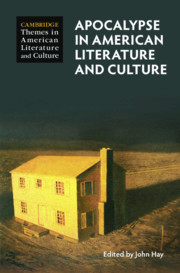Book contents
- Apocalypse in American Literature and Culture
- Cambridge Themes in American Literature and Culture
- Apocalypse in American Literature and Culture
- Copyright page
- Contents
- Figures
- Contributors
- Introduction The United States of Apocalypse
- Part I America as Apocalypse
- Chapter 1 The Apocalypse of Settler Colonialism and the Case for the Americocene
- Chapter 2 Apocalyptic Violence in Visual Media
- Chapter 3 Revelation, Secret Knowledge, and 9/11 Conspiracy Theory
- Chapter 4 Decolonial Eschatologies of Native American Literatures
- Part II American Apocalypse in (and out of) History
- Part III Varieties of Apocalyptic Experience
- Further Reading
- Index
Chapter 1 - The Apocalypse of Settler Colonialism and the Case for the Americocene
from Part I - America as Apocalypse
Published online by Cambridge University Press: 03 December 2020
- Apocalypse in American Literature and Culture
- Cambridge Themes in American Literature and Culture
- Apocalypse in American Literature and Culture
- Copyright page
- Contents
- Figures
- Contributors
- Introduction The United States of Apocalypse
- Part I America as Apocalypse
- Chapter 1 The Apocalypse of Settler Colonialism and the Case for the Americocene
- Chapter 2 Apocalyptic Violence in Visual Media
- Chapter 3 Revelation, Secret Knowledge, and 9/11 Conspiracy Theory
- Chapter 4 Decolonial Eschatologies of Native American Literatures
- Part II American Apocalypse in (and out of) History
- Part III Varieties of Apocalyptic Experience
- Further Reading
- Index
Summary
The intellectual territory of “apocalypse in American literature and culture” rightfully belongs to indigenous peoples as a result of their historical experiences of what historian Gerald Horne has recently called “the apocalypse of settler colonialism.” Indigenous speculative fiction occupies an epistemically privileged standpoint for historicizing and theorizing the planetary apocalypse that we all (and many nonhuman others besides) increasingly face in the form of biospheric deterioration—a deterioration so profound that it registers in the geologic record, prompting the formulation of a new epoch, the Anthropocene. This “end of the world” follows directly from the rapacious practices of dispossession and accumulation that ended indigenous worlds. This essay decolonizes the Anthropocene by coining the term Americocene to pinpoint a specific process of settler apotheosis as a key cause of our planetary plight. The designation Americocene traces the environmental degradation inscribed in the geologic record to the eschatological inscription of settler life into indigenous lands. Now more of us can see what indigenous peoples have always been in a position to see—namely, that the systems of production and social reproduction variously written into the earth by settler apotheosis promise not the advent of the millennium but the protraction of apocalypse.
Keywords
- Type
- Chapter
- Information
- Apocalypse in American Literature and Culture , pp. 17 - 29Publisher: Cambridge University PressPrint publication year: 2020

